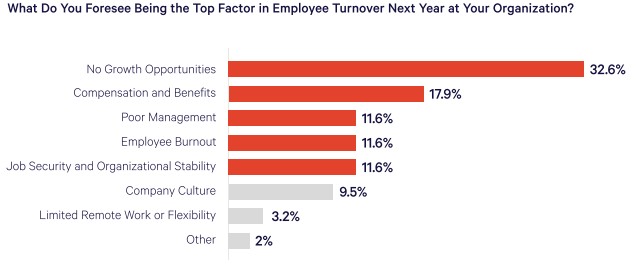In today’s competitive job market, businesses are constantly seeking ways to retain top talent and foster a thriving workforce. Imagine asking your employees: “Do you feel you have sufficient opportunities for career advancement here?” Would their response reflect satisfaction and enthusiasm, or reveal unmet expectations?
Research indicates a concerning trend. A McKinsey study revealed that a significant 41% of employees leave their jobs due to a lack of career advancement opportunities. This statistic resonates deeply within HR and Learning & Development (L&D) circles. Our own report, “Enterprise L&D in 2025: Predictions and Trends”, further emphasizes this concern, predicting that limited career growth will be a primary driver of employee turnover in the coming years.
Employee Turnover Factors: HR and L&D professionals recognize limited growth opportunities as a key driver of employees leaving.
The challenge is clear: employees crave growth. But what exactly are career development programs, and how can organizations effectively implement them to address this critical need? This article will delve into the definition of career development programs, explore their importance, provide practical implementation strategies, and showcase inspiring examples from companies that are successfully leveraging these programs.
Defining Career Development Programs
Career development programs are structured initiatives designed to align employee skills, aspirations, and career objectives with both current and future opportunities within an organization. They represent a proactive approach to nurturing employee potential, ensuring they are equipped for success within the company and throughout their broader career journey.
These programs encompass a wide range of activities, from external certifications and industry conferences to internal initiatives like peer mentoring programs. The core principle is to provide employees with continuous learning and growth opportunities that are directly relevant to their professional trajectory.
It’s important to distinguish between different types of career development. Traditional on-the-job training forms a foundational aspect, focusing on skills enhancement within the employee’s current role. Academic career development involves formal education, such as enrolling employees in professional courses offered by academic institutions. Bootcamps, on the other hand, are intensive, short-term programs designed to rapidly develop specific hard skills, facilitating upskilling or career transitions. Whether focusing on upskilling current employees or enabling them to pivot to new career paths, career development programs are adaptable to various organizational and individual needs.
The Undeniable Importance of Career Development Programs
HR and L&D professionals understand that investing in talent development is not merely a perk, but a strategic imperative. It’s about more than just employee retention; it’s about cultivating a stronger, more engaged, and adaptable workforce. While effective employee training requires significant effort, the benefits of a robust career development program are substantial and far-reaching.
Boosting Employee Retention
Employee career development stands out as a highly effective strategy for enhancing employee retention rates. These programs demonstrate a commitment to employees’ long-term growth, fostering loyalty and reducing turnover. When employees perceive that their personal and professional development is valued and supported, they are significantly more likely to remain with the organization.
Consider this compelling statistic: 94% of employees have indicated they would stay at their current company if the organization invested in their career growth. This highlights the profound impact of career development programs on employee loyalty. Investing in employee growth strengthens your employer brand and cultivates a positive company culture, resulting in long-term employee commitment.
Upskilling and Reskilling the Workforce
In today’s rapidly evolving business landscape, continuous learning is paramount. Career development programs empower employees to stay abreast of industry trends by facilitating upskilling and reskilling. This proactive approach ensures that your workforce possesses the competencies required for future roles and aligns with the evolving needs of your company.
By prioritizing internal talent development, organizations can often avoid the need for external hiring. Developing existing employees to fill new roles is a cost-effective strategy, saving on recruitment expenses and onboarding time. Furthermore, internal candidates already possess valuable institutional knowledge and a deep understanding of the company culture.
Nurturing Leadership Potential
Career development programs play a crucial role in leadership development. Well-designed programs can cultivate essential leadership skills, such as decision-making, strategic thinking, and cross-functional collaboration. Through initiatives like high-potential leadership programs, organizations can identify and nurture future leaders from within their ranks.
Integrating a dedicated leadership development program into your overall strategy builds a robust leadership pipeline. This ensures a steady supply of skilled managers equipped to guide the company through change, foster team success, and drive organizational growth.
Real-World Examples of Successful Career Development Programs
For organizations seeking inspiration in establishing or enhancing their own career development programs, examining successful initiatives implemented by other companies can be invaluable. Here are six compelling examples of real-life career development programs in practice:
1. Marriott International
Marriott International demonstrates a strong commitment to early career development through its comprehensive programs. Their hotel internship programs offer recent graduates practical, hands-on learning experiences under the guidance of industry experts, bridging the gap between academic knowledge and real-world application. The Voyage Leadership Development Program further supports new and current employees in developing discipline-specific management skills while expanding their professional networks within the hospitality industry.
2. Workday
Workday has implemented a skill-based HR strategy that empowers employees to identify and pursue specific skills aligned with their career goals. Their career development program facilitates internal mobility by connecting employees with opportunities to collaborate with different teams across the organization. This cross-functional exposure allows employees to acquire new skills, broaden their perspectives, and navigate their career paths within Workday. Since its inception in 2021, participants in Workday’s career development program have consistently reported positive experiences and career growth.
3. Randstad
Randstad, a global human resources organization, effectively leverages professional mentoring programs as a cornerstone of its employee development strategy. By meticulously measuring the impact of their mentoring initiatives, Randstad has demonstrated a remarkable 49% reduction in employee turnover among program participants. Furthermore, they observed a significant increase in employee engagement and job satisfaction, highlighting the powerful impact of mentorship on employee retention and morale.
4. Ethena
Ethena, a company specializing in interactive compliance training, exemplifies how smaller organizations can effectively integrate their core values into career development. Ethena provides its employees with unrestricted access to its entire course catalog, encompassing a wide range of topics from DEI and unconscious bias training to leadership skill-building and industry-specific competencies. This commitment to continuous learning ensures that Ethena’s employees are not only skilled in their respective roles but also deeply aligned with the company’s values and mission.
5. Aflac
While widely recognized for its iconic duck mascot, insurance provider Aflac also distinguishes itself through its robust career development programs. Aflac’s Career Success Centers offer employees personalized career counseling services. Employees can schedule appointments with career counselors to explore their career aspirations and develop actionable strategies for achieving their goals within the company. Aflac’s career advancement programs feature diverse activities, including Career Insights sessions that provide employees with direct interaction with company leaders from various departments. These sessions offer invaluable insights into the skills and knowledge required for success in different roles across the organization.
6. Accenture
Accenture, a global IT and professional services giant, demonstrates an exceptional commitment to employee development, investing nearly $1 billion USD annually in career development programs. Their comprehensive approach focuses on ensuring employees’ skills remain cutting-edge and aligned with evolving industry demands. Accenture supports employees in obtaining external certifications, such as Salesforce and AWS, and provides specialized leadership training programs. Furthermore, they offer targeted initiatives to cultivate niche industry-specific skillsets, ensuring that employees across all levels and departments have ample opportunities for continuous learning and career progression.
Numerous companies are realizing significant benefits from well-structured career development programs. To explore further examples, delve into resources highlighting the best company training programs.
Key Strategies for Building Effective Career Development Programs
Having established a clear understanding of what career development programs are and their inherent value, let’s explore practical strategies for implementing impactful career advancement initiatives within your organization.
Target Specific Employee Groups
A crucial first step involves defining the target audience for your career development program. Consider whether the program will primarily serve early-career professionals, high-potential employees preparing for leadership roles, or underrepresented talent pools. Understanding the specific needs and aspirations of your target cohort is essential for tailoring program content and delivery methods. Analyze the skills, learning preferences, and relevant topics for each group to ensure program relevance and effectiveness.
Implement Collaborative Development Plans (IDPs)
Individual Development Plans (IDPs) provide a personalized approach to career growth. An IDP is a structured plan jointly created by an employee and their manager, focusing on the employee’s unique career aspirations and development needs. Rather than relying on generic training catalogs, IDPs ensure that development activities are directly relevant and aligned with individual goals.
The IDP process fosters a collaborative partnership between managers and employees, emphasizing continuous feedback and proactive planning. This personalized approach empowers employees to take ownership of their career journeys and ensures that development efforts are targeted and impactful in achieving both short-term and long-term career objectives.
Integrate Mentorship Programs
Mentorship programs offer invaluable support for employee growth and development. Pairing employees with experienced mentors provides junior team members with guidance, support, and access to valuable insights. Even senior executives can benefit from reverse mentorship, gaining fresh perspectives and staying connected to emerging trends.
Career mentors play a crucial role in helping mentees define their career goals and navigate the path to achieving them. Integrating a mentoring program into your broader career development strategy provides enhanced support for employees seeking to excel, fostering increased engagement and strengthening their connection with the company as a whole.
Put Employees on a Growth Trajectory Today
A robust career development program is not merely a retention tool; it is a fundamental investment in building a stronger, future-ready workforce. These programs empower employees to enhance their skills in their current roles, navigate career advancement opportunities (whether through traditional hierarchical ladders or more flexible career lattices), and explore diverse career paths within the organization.
Providing employees with the tools and support they need to grow and thrive is essential for organizational success. Platforms like Together’s mentoring software can streamline the creation and management of career advancement programs, simplifying administration and enhancing the participant experience.
To discover how Together’s mentoring software can empower your career development program, book a demo today.

